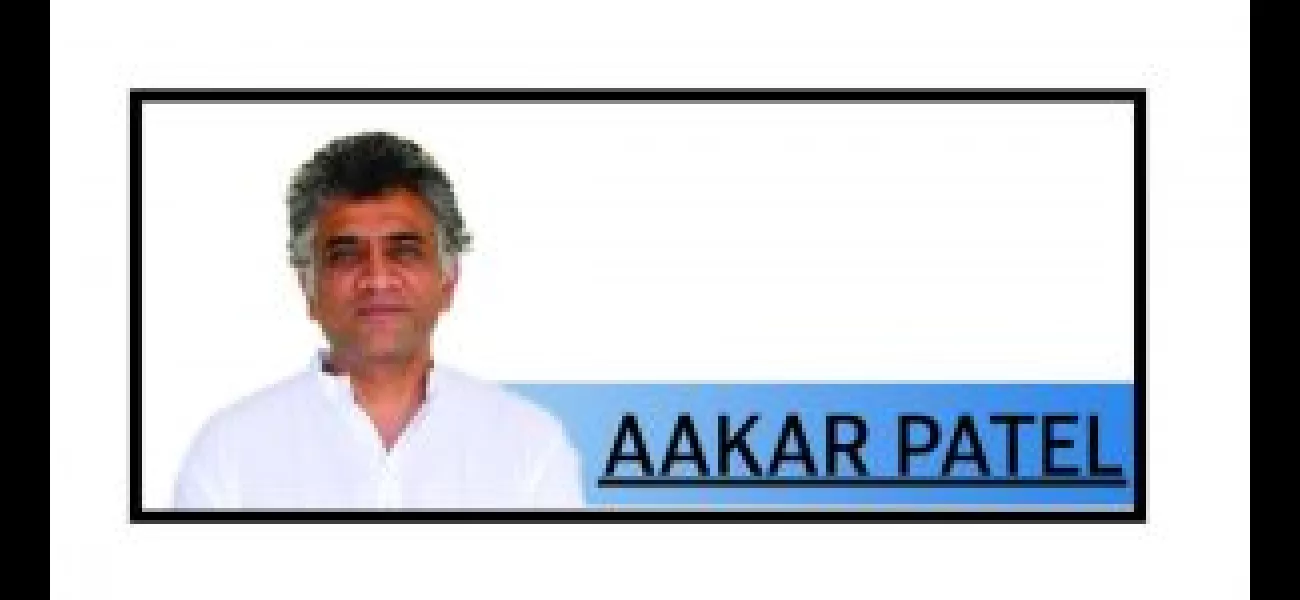Unclear set of beliefs or principles.
India's biggest political party, BJP, lacks clear understanding of its ideology. It promotes anti-dynasty and economic growth, but not always followed. Main component is Hindutva.
May 26th 2024.

The Bharatiya Janata Party holds immense political power in India, but its ideology remains largely misunderstood. While some aspects, such as their opposition to dynastic rule and promise of economic progress, are clear, the party's adherence to these principles is not always consistent. However, the most significant component of their ideology, known as Hindutva or Hindu nationalism, remains vague and raises questions about its meaning and purpose.
In an effort to unravel this enigma, Devanura Mahadeva, a renowned writer from Karnataka, delves deep into the parent organization of the BJP. His book, "RSS: The Long and Short of It," dissects the RSS and its objectives through a unique approach of analyzing primary texts on Hindutva. These texts include the works of VD Savarkar and MS Golwalkar, namely "Bunch of Thoughts." Mahadeva shares his inspiration for this undertaking through a thought-provoking parable. He likens the RSS to a powerful sorcerer whose life is stored in a parrot hidden in a distant cave, rendering him invincible to any attack. The only way to defeat him is to find and destroy this life source, which is what Mahadeva sets out to do by exploring the depths of Hindutva.
Through his encounters with Golwalkar, Mahadeva discovers that the RSS leader worships the caste system and expects others to do the same. In "Bunch of Thoughts," Golwalkar proclaims that the Hindu people are his god, and this god is manifested through the caste system, as described by Manu. In one instance, Golwalkar even suggests using caste for cross-breeding superior humans, much like animals. This is similar to the medieval practice in Europe called "droit du seigneur," where feudal lords had sexual relations with subordinate women on their wedding nights. Interestingly, Golwalkar fails to acknowledge the exploitative nature of such practices and instead glorifies them as noble traditions.
Although these disturbing beliefs are not actively promoted by the RSS or the BJP, they have not been retracted either, indicating a lack of accountability. Perhaps this is because they are confident that very few individuals, like Mahadeva, will take the time to read and analyze their primary texts. It is indeed intriguing to witness a recent TV debate on whether the caste system should be revered and perpetuated, as desired by the RSS.
Mahadeva's work offers unique insights into the RSS's methods of eroding the diversity of Indian society and subsuming all religions under the umbrella of Hinduism. He points out how the RSS neutralizes the religions born in India, like Jainism, Buddhism, Sikhism, and Lingayatism, and insists on imposing the Chaturvarna system. He also sheds light on the lack of critical thinking within the RSS, as evidenced by the title of Golwalkar's book, "Bunch of Thoughts," which contains a series of erroneous and dangerous beliefs from a bygone era. Mahadeva argues that the RSS discourages individual thought and encourages conformity to their strict rules and orders. He even quotes Golwalkar, who states that their volunteers must do as they are told, without any room for their own judgment.
Among the many disturbing teachings that the RSS imparts to its cadre, one is the belief that the Indian Constitution is flawed. They reject the concept of states, claiming that there can only be one Bharat Mata, and the existence of separate states, like Karnataka, Gujarat, or Bengal, is incorrect. This emphasis on homogeneity over diversity is also reflected in their language, as they refer to Adivasis as "vanvasis," eroding their unique identity.
Mahadeva aptly describes Hindutva as a "cow-faced tiger" that is slowly devouring Indian society from within. He acknowledges that the prime minister may be popular, but he is merely a "utsava murti," a replica of an idol that is paraded during festivals. The real power lies in Nagpur, inside the RSS headquarters, where their true deity resides. The only qualifications required for the utsava murti are the ability to put up a show and mesmerize the masses. Mahadeva questions if this is not what we are witnessing today.
In light of these disturbing revelations, Mahadeva offers a solution, comparing it to a village overrun by thieves. He suggests that the entire village must wake up and take turns patrolling at night, while the women carry chilli powder for protection. Similarly, he urges society to awaken and be vigilant against the RSS and its divisive tactics. He also emphasizes the importance of speaking up against injustice and promoting values like love, tolerance, and justice. Despite referring to his work as a "booklet," Mahadeva's book is a compelling and insightful read, offering a critical perspective on the current state of affairs in India. It is a must-read for anyone seeking to understand the true intentions of the RSS and the BJP.
In an effort to unravel this enigma, Devanura Mahadeva, a renowned writer from Karnataka, delves deep into the parent organization of the BJP. His book, "RSS: The Long and Short of It," dissects the RSS and its objectives through a unique approach of analyzing primary texts on Hindutva. These texts include the works of VD Savarkar and MS Golwalkar, namely "Bunch of Thoughts." Mahadeva shares his inspiration for this undertaking through a thought-provoking parable. He likens the RSS to a powerful sorcerer whose life is stored in a parrot hidden in a distant cave, rendering him invincible to any attack. The only way to defeat him is to find and destroy this life source, which is what Mahadeva sets out to do by exploring the depths of Hindutva.
Through his encounters with Golwalkar, Mahadeva discovers that the RSS leader worships the caste system and expects others to do the same. In "Bunch of Thoughts," Golwalkar proclaims that the Hindu people are his god, and this god is manifested through the caste system, as described by Manu. In one instance, Golwalkar even suggests using caste for cross-breeding superior humans, much like animals. This is similar to the medieval practice in Europe called "droit du seigneur," where feudal lords had sexual relations with subordinate women on their wedding nights. Interestingly, Golwalkar fails to acknowledge the exploitative nature of such practices and instead glorifies them as noble traditions.
Although these disturbing beliefs are not actively promoted by the RSS or the BJP, they have not been retracted either, indicating a lack of accountability. Perhaps this is because they are confident that very few individuals, like Mahadeva, will take the time to read and analyze their primary texts. It is indeed intriguing to witness a recent TV debate on whether the caste system should be revered and perpetuated, as desired by the RSS.
Mahadeva's work offers unique insights into the RSS's methods of eroding the diversity of Indian society and subsuming all religions under the umbrella of Hinduism. He points out how the RSS neutralizes the religions born in India, like Jainism, Buddhism, Sikhism, and Lingayatism, and insists on imposing the Chaturvarna system. He also sheds light on the lack of critical thinking within the RSS, as evidenced by the title of Golwalkar's book, "Bunch of Thoughts," which contains a series of erroneous and dangerous beliefs from a bygone era. Mahadeva argues that the RSS discourages individual thought and encourages conformity to their strict rules and orders. He even quotes Golwalkar, who states that their volunteers must do as they are told, without any room for their own judgment.
Among the many disturbing teachings that the RSS imparts to its cadre, one is the belief that the Indian Constitution is flawed. They reject the concept of states, claiming that there can only be one Bharat Mata, and the existence of separate states, like Karnataka, Gujarat, or Bengal, is incorrect. This emphasis on homogeneity over diversity is also reflected in their language, as they refer to Adivasis as "vanvasis," eroding their unique identity.
Mahadeva aptly describes Hindutva as a "cow-faced tiger" that is slowly devouring Indian society from within. He acknowledges that the prime minister may be popular, but he is merely a "utsava murti," a replica of an idol that is paraded during festivals. The real power lies in Nagpur, inside the RSS headquarters, where their true deity resides. The only qualifications required for the utsava murti are the ability to put up a show and mesmerize the masses. Mahadeva questions if this is not what we are witnessing today.
In light of these disturbing revelations, Mahadeva offers a solution, comparing it to a village overrun by thieves. He suggests that the entire village must wake up and take turns patrolling at night, while the women carry chilli powder for protection. Similarly, he urges society to awaken and be vigilant against the RSS and its divisive tactics. He also emphasizes the importance of speaking up against injustice and promoting values like love, tolerance, and justice. Despite referring to his work as a "booklet," Mahadeva's book is a compelling and insightful read, offering a critical perspective on the current state of affairs in India. It is a must-read for anyone seeking to understand the true intentions of the RSS and the BJP.
[This article has been trending online recently and has been generated with AI. Your feed is customized.]
[Generative AI is experimental.]
0
0
Submit Comment





